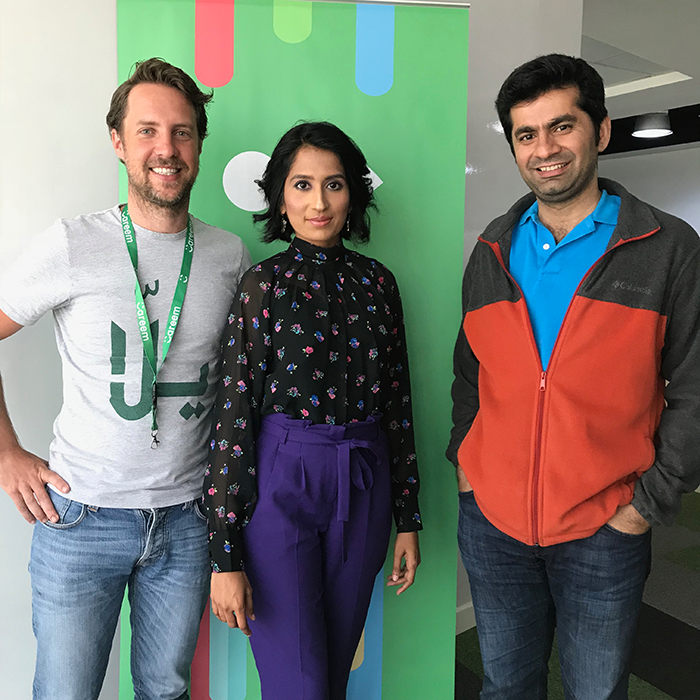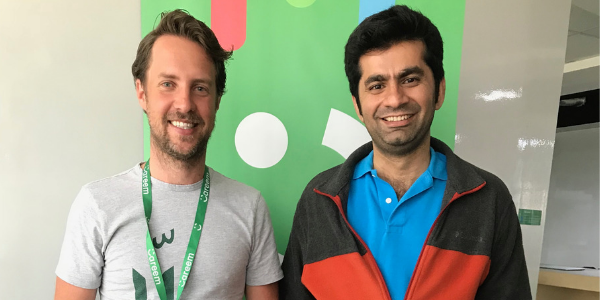
They came. They hustled. They conquered.
No one would have thought that two former strategy consultants toiling away in a tiny office in Shatha Tower in Dubai Media City would one day go on to create what is considered the region’s first true unicorn: Careem. The transportation network now extends to well over 100 cities in 14 countries, serving over 15 million users, and its exponential growth has written a new playbook for what a homegrown startup can achieve.
This is a startup that’s gotten the world to sit up and take notice. So when I sit down to talk with Magnus Olsson and Mudassir Sheikha, co-founders of Careem, the lack of any airs and the surprising candor (there were lots of laughs and childhood stories shared) made me realize these are two individuals who believe in keeping things simple, even when it comes to managing your money.
Over the course of an hour, here’s what they divulged:
Childhood Lessons That Last a Lifetime
“I grew up in Sweden where you don’t really talk about money. It’s part of our socialist heritage,” explains Olsson. Magnus still cherishes early lessons his parents–who he says were very frugal–taught him about finance:
“The first and most important lesson was that I had to work for an income.”
Olsson would get paid a tiny sum in return for doing chores and his parents encouraged him to save this money for his “wants.” “I loved technology. When I wanted a computer, I had to save up quite a lot for it and even then I could only afford a used one, something I found in the classifieds. I must have been 8 or 9 years old when we bought it. It was a very cold winter so on the drive home, there was condensation from the heater car which must have got into the computer…so let’s just say, I learned the value of saving and loss at the same time!”
Magnus shares more of his father’s words of wisdom on money and why a capital expense is always more advisable versus running cost (hint: you may want to rethink all those extra subscriptions!)
For Mudassir, growing up in a middle-income household in Karachi, together with the income inequality he witnessed in the city, tremendously influenced his approach to money. “My parents were not that highly educated, they had both only completed high school. But their principles about money I value to this day as they still ring true.”
Mudassir shares the lessons he learned from his parents about money and the one skill he credits learning from his mother even though it embarrassed him growing up: negotiation!
On Achieving Financial Freedom
Mudassir, who joined the startup world soon after completing his MBA, said he was always mindful of saving. “In the beginning, my threshold was low. I was happy having just ten thousand dollars saved because it was enough for me and the simple life I led.” The turning point came when one of the startups he developed while living in Pakistan was acquired for a tidy sum.
“I had a financial cushion, so I didn’t need to worry about not having a salary for the next two to three years. My savings essentially were a runway that gave me time to figure out my next step and it turns out that next step happened to be Careem.”
Why Being Frugal Was Crucial to Careem’s Success
“As a consultant, you get used to a very cushy lifestyle. Business-class flights, the best hotels, and restaurants. But when we decided to pursue the startup route we both became very comfortable downsizing immediately.” revealed Mudassir.
“I don’t think we would have survived if we weren’t frugal from day one,” adds Magnus.
“We didn’t take a salary for most of the first two years and yes, we were fortunate to be in a privileged position to do so because we had our savings.”
Mudassir remembers the first day he and Magnus started working on Careem and how they were frugal from day one. Magnus explains why being frugal gave them an advantageous position when it came time to secure further rounds of funding.
The Importance of an “Abundance” Mindset
Mudassir debunks the usual approach to pursuing one’s passion. “Most of us put conditions on ourselves: I need x million in the bank and then I will do this and that. But over the years, I’ve come to realize…instead of operating from a scarcity mindset, thinking I don’t have this in place, I don’t have that in place…let’s assume you already have that in place, provided you are on a good trajectory. When you align your actions and efforts with what you want to do, with what you believe in, you will naturally operate at a higher level, since you are following your true purpose.”
Savings: Why Lifestyle Choices Count More Than Cost of Living
“A lot of people will say Dubai has a very high cost of living that makes saving difficult but I would say, it’s not cost of living that makes savings a challenge, it’s the lifestyle choices we make. Consider that our captains make anything from three to five thousand dirhams a month and they still manage to send a significant portion of their income back to their home countries. They’ve adjusted their lifestyle-from the rent they pay to the food they eat-to allow that to happen. If savings are a priority, you make sacrifices.”
On Their Investment Preferences
Like most entrepreneurs, Magnus believes in investing money into efforts that he knows and trusts, such as his own personal efforts and that of his team at Careem.
Considering the manic schedules of two of the Middle East’s most celebrated entrepreneurs, it should come as no surprise that both Magnus and Mudassir believe in passive investing. Both Olsson and Sheikha have a diversified approach to their investment portfolio.
Watch them break down their personal approach towards investing:
Ready to invest in your future?
